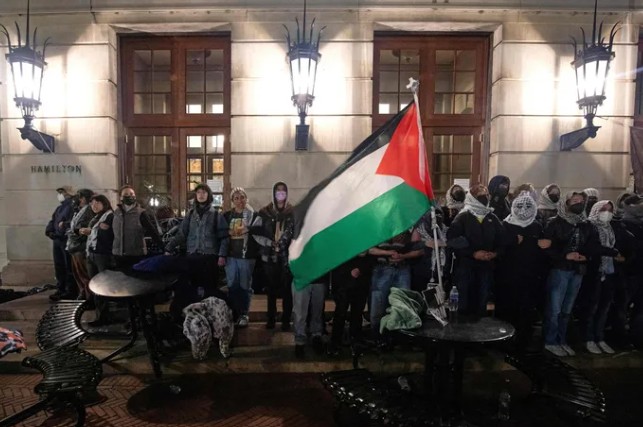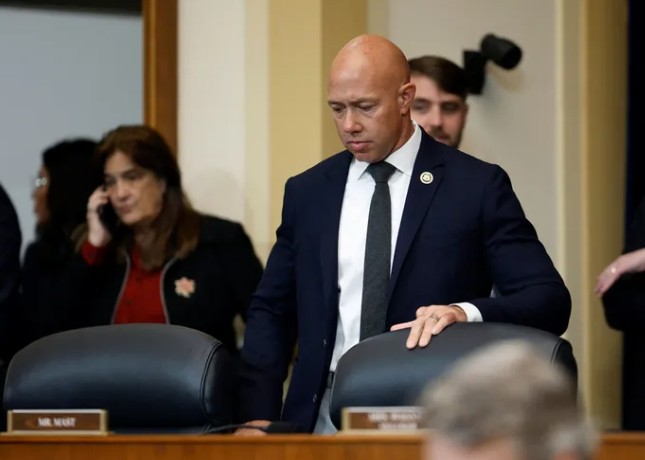Four weeks before U.S. President-elect Donald Trump takes power, all his rhetoric and appointments are indicating that his campaign's vow to crack down on pro-Palestinian sentiment in America will be a defining factor of his administration's early days.
Throughout the campaign, both Trump and the Republican Party insisted that such a clampdown would be quick and complete. After Trump's speedy cabinet appointments and ahead of a Congress ruled by a GOP majority, the fight against the pro-Palestinian movement might be one of the only things that has a clear path across the government.
Once Trump's picks for the top diplomatic positions are in place, such as Marco Rubio as secretary of state and Elise Stefanik as UN ambassador, the harshest step – the deporting of pro-Palestinian protesters who have student visas – could be the first move. Both Rubio and Stefanik are well-known proponents of such a step, one of Trump and the GOP's few solid policy commitments on the Israeli-Palestinian conflict during the campaign.
In October, Rubio wrote to the current secretary of state, Antony Blinken, urging him to "immediately perform a full review and coordination effort to revoke the visas of those who have endorsed or espoused Hamas' terrorist activity."
Stefanik, meanwhile, has doubled down on her star-making turn as university-president interrogator by calling for students' deportation. She told Fox News in May that these students "are pro-Hamas members of a mob who are calling for the eradication of Israel. They are calling for genocide against Jews around the world and in America. It is unthinkable that we are allowing this to happen at U.S. universities."
The blueprint is there
Other nominees more focused on domestic matters have also suggested that the pro-Palestinian protest movement will be a key issue. Among them is Pam Bondi, Trump's second attempt at a nominee for attorney general. The former Florida attorney general has called for a revocation of visas and condemned the campus protests.

"The thing that's really the most troubling to me these students in universities in our country, whether they're here as Americans or if they're here on student visas, and they're out there saying 'I support Hamas,'" she told Newsmax last year.
Bondi added: "Frankly they need to be taken out of our country or the FBI needs to be interviewing them right away."
Trump's choice to lead the FBI is controversial loyalist Kash Patel. While the former federal prosecutor doesn't have much of a record on campus protests, he is most notorious for his desire to remove any of Trump's critics and doubters from the national security apparatus.
Further, Patel's experience as the National Security Council's senior director of counterterrorism during Trump's first term positions him to crack down on pro-Palestinian sympathizers. A blueprint for this is detailed in Project Esther, a plan to combat antisemitism unveiled by the Heritage Foundation, which is behind Project 2025, the 922-page paper outlining conservatives' plans to fundamentally alter the government.
The underlying thesis of Project Esther – a more tractable 33 pages – is that "America's virulently anti-Israel, anti-Zionist, and anti-American 'pro-Palestinian movement' is part of a global Hamas Support Network (HSN)."
"The thing that's really the most troubling to me these students in universities in our country, whether they're here as Americans or if they're here on student visas, and they're out there saying 'I support Hamas,'" she told Newsmax last year.
Bondi added: "Frankly they need to be taken out of our country or the FBI needs to be interviewing them right away."
Trump's choice to lead the FBI is controversial loyalist Kash Patel. While the former federal prosecutor doesn't have much of a record on campus protests, he is most notorious for his desire to remove any of Trump's critics and doubters from the national security apparatus.
Further, Patel's experience as the National Security Council's senior director of counterterrorism during Trump's first term positions him to crack down on pro-Palestinian sympathizers. A blueprint for this is detailed in Project Esther, a plan to combat antisemitism unveiled by the Heritage Foundation, which is behind Project 2025, the 922-page paper outlining conservatives' plans to fundamentally alter the government.
The underlying thesis of Project Esther – a more tractable 33 pages – is that "America's virulently anti-Israel, anti-Zionist, and anti-American 'pro-Palestinian movement' is part of a global Hamas Support Network (HSN)."

The task force's mission statement calls for a coalition to "dismantle the infrastructure" that purportedly sustains the alleged network. This would take one to two years. "Supported by activists and funders dedicated to destroying capitalism and democracy, the HSN benefits from the support and training of America's overseas enemies," the document states.
It adds that this network "seeks to achieve its goals by taking advantage of our open society, corrupting our education system, leveraging the American media, coopting the federal government, and relying on the American Jewish community's complacency."
The document suggests how a potential Trump administration would crack down on protesters, something he has promised. It also calls for the deporting of protesters in the United States on student visas and the targeting of universities' tax-exempt status. It notes laws that might "exploit [the network's] vulnerabilities," require representatives of foreign entities to disclose their connections, and target organized crime and racketeering.
Hardliner Harmeet Dhillon
One bill that will not be in the law books anytime soon is the Antisemitism Awareness Act, which is aimed at combating campus antisemitism. It also requires the Education Department to take the International Holocaust Remembrance Alliance definition of antisemitism into account when determining if an action or practice that violates Title VI of the 1964 Civil Rights Act was motivated by antisemitism.
The House of Representatives overwhelmingly passed the act earlier this year, despite concerns on the left that criticism of Israel would be conflated with antisemitism and on the right that the bill had dramatic implications on freedom of speech. There were also tropes from far-right Republicans that the bill would state that Jews killed Jesus.
Outgoing Senate Majority Leader Chuck Schumer has kept the bill off the Senate floor for a vote by attaching it to various other packages that he hopes to push through.
Amid this stalemate, another notable opponent has emerged: Harmeet Dhillon, Trump's choice to lead the Justice Department's Civil Rights Division, which will play a major role in enforcing federal action combating antisemitism.

Dhillon, one of Trump's top legal minds behind his efforts to challenge the 2020 election results, slammed the Antisemitism Awareness Act upon its House passage. "I have been a First Amendment and religious liberties lawyer for minority and majority faith communities for decades and this bill is knee-jerk anti-constitutional dreck," she wrote on X.
She added: "Do better, think harder, and be smarter, Congress. 'Hate speech' laws are a liberal concept." But Dhillon has joined her new colleagues in being a vocal advocate for cracking down on the campus protest movement.
"Sue Yale," she wrote on X in April. "Sue every university that refuses to keep students safe based on their religion. Make them regret their choices. Deplete their endowments. Sue each and every violent protester and organizers. Drain their bank accounts. Sow salt in their career plans."
Dhillon followed that post by laying into a protest at UCLA: "I defend the right of these jackass terrorist apologists to protest, but they do NOT have the right to block access to other students or prevent them from going to class. My tax dollars are subsidizing UCLA and the Regents need to get their act together ASAP or be sued!"
Linda McMahon, Trump's education secretary nominee, has also publicly committed to prioritizing the issue, even if the incoming president has vowed to dismantle her department.
"Certainly. I don't think we should have any kind of discrimination anywhere, and I absolutely abhor any kind of violence that we have seen on campus. It should not be allowed," she told Jewish Insider without specifying what plan she supports. "We have lots of priorities that I'm going to be dealing with, and certainly anything that is against the safety and welfare of any of our students will be a priority."
The proposed defunding of the Education Department is perhaps the plank in Project 2025 that most concerns the American-Jewish community. The Office of Civil Rights, which is responsible for investigating and adjudicating allegations of antisemitism, is part of this department and has opened at least 145 investigations into such complaints.

Hardliner Brian Mast
This past summer, a rare coalition of nearly two dozen Jewish organizations across the political and denominational spectrum urged Congress to "provide the highest possible funding" for the Office of Civil Rights, despite the deep disagreements regarding antisemitism on Capitol Hill and in the Jewish world.
House Republicans, though they deemed the office's funding insufficient, voted to cut $10 million more after accusing it of failing to prioritize antisemitism. Several Trump-allied Republicans have also highlighted the office's role in culture war issues like Title IX and what they call "forcing women to compete against males in sports."
Holding a razor-thin majority and already plagued by infighting, the House GOP might find that advancing legislation relating to the Palestinians is the only influential work it can get done in the next session of Congress.
In a surprise development, Rep. Brian Mast has been slated to chair the House Foreign Affairs Committee after Trump advocated on his behalf. The Florida congressman has long been considered the U.S. lawmaker most hostile to the Palestinians. He has decried efforts to bolster humanitarian aid for Gaza and dismissed the notion of innocent Palestinian civilians.
"I don't think we would so lightly throw around the term 'innocent Nazi civilians' during World War II. It is not a far stretch to say there are very few innocent Palestinian civilians," he said in remarks that led to an unsuccessful effort in the House to formally rebuke him.
Mast, an evangelical Christian, once volunteered with the Israeli military, and he wore his uniform in Congress in the days after the October 7 attack. That was a way to protest Rep. Rashida Tlaib's placing of a Palestinian flag outside her office.
Mast has also condemned the concept of a two-state solution while spearheading legislation to permanently cut U.S. funding for the UNRWA refugee agency, among other hostile bills. He has also slammed U.S. efforts to secure a cease-fire in Gaza and advocated for expedited and expanded weapons sales to Israel.


Spread the word